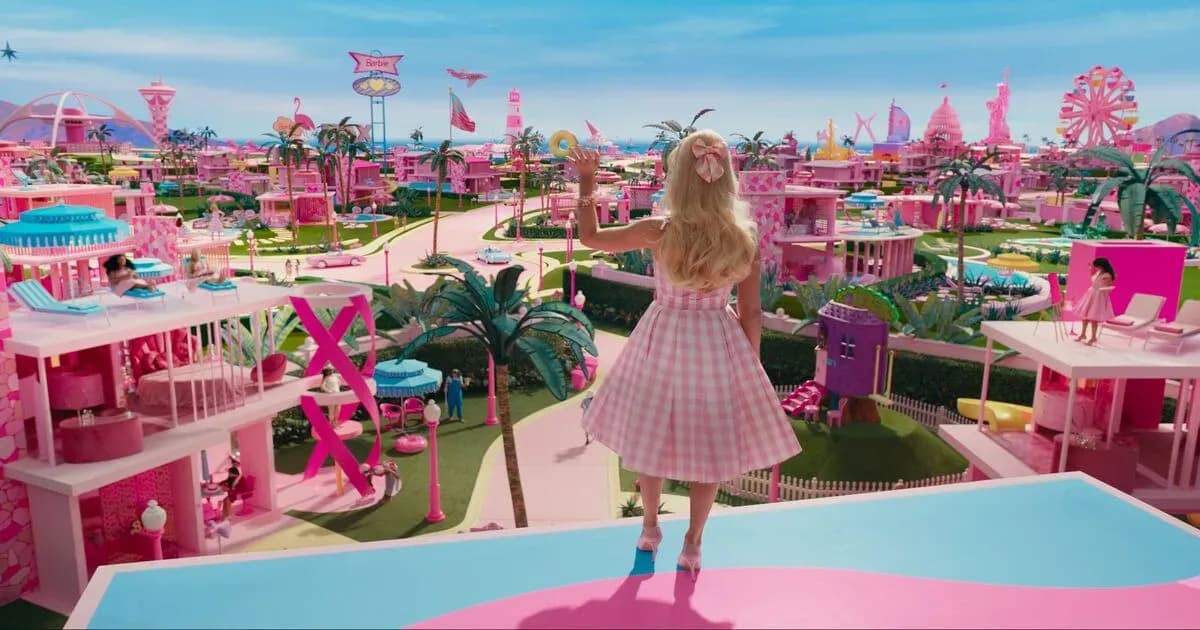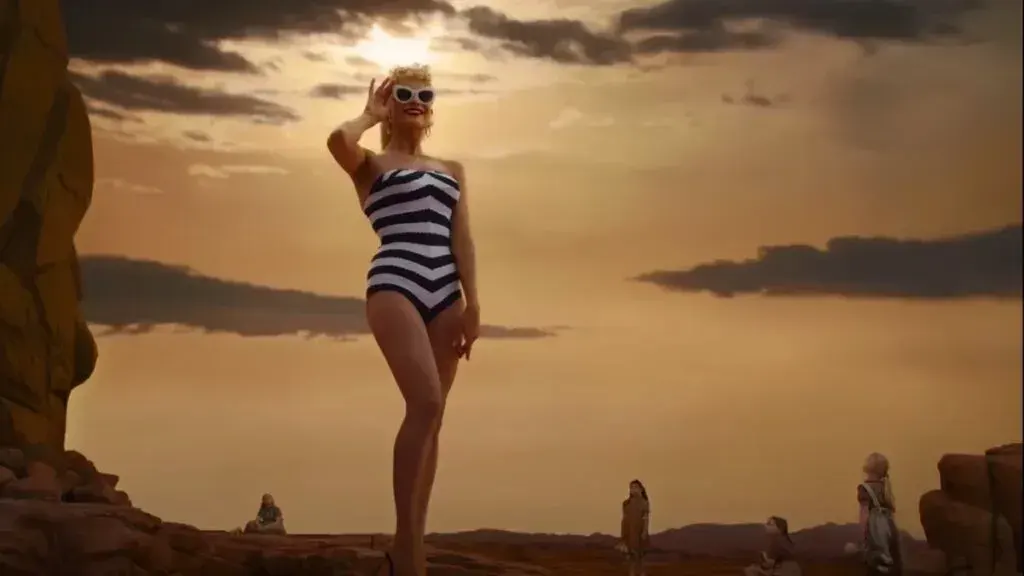Barbie (Greta Gerwig, 2023) Review
A postmodern film about the popular plastic doll.

It’s not common for me to leave a cinema astounded by a film about a toy and a toy brand, largely due to the increased consumption of technology products by today’s children. The premise of seeing the likes of Margot Robbie and Ryan Gosling in the cast of a Barbie movie directed by Greta Gerwig was a prelude to warning the audience that this wasn’t going to be another conventional movie about the popular plastic doll. What really solidified this notion for me, beyond the factors I’ve already mentioned, was the moment I saw the film’s opening sequence parodying the iconic opening of 2001: A Space Odyssey. Of all the times this has been done in cinema story, Barbie wasn’t the kind of film I expected to spoof it.
As if these aspects didn’t surprise me enough, I definitely didn’t expect Barbie to be a satirical movie influenced by postmodernism and all the meta elements that this concept implies, highlighting Barbie’s self-awareness and Mattel’s evil representation of itself. This mixture of themes is orchestrated by a conventional Hollywood script of many commercial films, avoiding any significant risks in this regard.
At its core, Barbie is an American progressive feminist manifesto that presents the antithesis of Barbie Land, a beautifully decorated and colorful world where peace and matriarchy reign, and the real world where “evil corporations and patriarchy” (as represented by Greta Gerwig) rule. The role of Ken (Ryan Gosling) serves mainly to reinforce the latter notion and to extrapolate it to Barbie Land, disrupting the peaceful harmony that had prevailed.
The evolution of Kens’ society over the course of the film is definitely the most interesting story arc, the turning point of which occurs when Ken discovers patriarchy in the real world, leading to its implementation in Barbie Land. The Kens then realize that men aren’t Barbies’ dolls and that they don’t have to fight with each other, which ultimately breeds more camaraderie among them and prevents them from seeing each other as competition. As the Barbies try to eradicate the patriarchy, the ghost of Ruth Handler, the creator of the Barbie doll, tells Barbie (Margot Robbie) that Ken will be like Barbie in the future. In fact, by the end of the movie, the Kens get representation in the Barbie Land Parliament. This whole plot is reminiscent of the course of feminism throughout history, but with the genders reversed. Its culmination feels like a positive message to the men in the real world, as the sense of brotherhood among us, men, is definitely further from the idealized sisterhood of Barbie. “I am Kenough” is, aside from being a funny pun, a strong realization of the Kens overcoming the constant feeling of inadequacy that men tend to feel in our individualistic society because of comparing ourselves to others in the search of “success” and validation from others a.k.a. being wealthy and having a gorgeous girlfriend.
Even taking into account the satirical tone of the film and the concept of reversing gender roles, the way men are portrayed can even be seen as touching on misandry because of how horrible patriarchy is portrayed in comparison to matriarchy, which according to the film seems to be an ideal social system where everyone is happy and hardly ever thinks about issues that cause them hardship. Although I laughed and took this portrayal in good faith because of how hyperbolic and unreal it is, I can’t help but think that this may be how the filmmakers actually see male society, which by today’s standards is an accepted perspective due to the socio-political climate of 2023 and the ongoing rise of “feminism”. I wonder what the reception of the film would have been if matriarchy had been depicted as the evil social system instead of patriarchy…
The “hyperbolic and unreal” elements I mentioned in the previous paragraph are well illustrated by situations such as the extreme sexualization of Barbie by men as soon as she enters the real world, and Mattel being run by a bunch of inept men while an intelligent woman who potentially outperforms them runs the door. However, there are some lines in the film that shed a light of self-awareness of the current situation, such as the following transcripts of some dialogues:
Ken: I’ll take a high level, high paying job with influence, please.
Corporate Man: Okay, you’ll need at least an MBA. And a lot of our people have PhDs.
Ken: Isn’t being a man enough?
Corporate Man: Actually right now, it’s kind of the opposite.
We still do it [patriarchy] here, we just hide it really well.
With all this in mind, the question arises: are the filmmakers trying to portray these cases as close to real life as possible, or are they deliberately exaggerating them for comedic purposes? In the end, we see that men aren’t treated like complete idiots and that their plot ends in a fair resolution, which prevents the title from being blatant feminist propaganda. Nevertheless, the ambivalent interpretations that can be made of the portrayal of men are uncertain and don’t lead to a conclusive answer to this question.

Aside from the gender conflict, the film also touches on unexpected topics for a movie about a toy, such as death and the dreaded effects of aging. The moment the former is first brought up at Barbie’s party is hilarious because of how surreal it is that a toy would even pose such a question. Asking out loud “Do you guys ever think about dying?” causes panic among the partygoers because it makes them think about not-so-glamorous and non-hedonistic concepts. It is the first turning point of the plot, which eventually leads to the idea that Barbie has said thoughts because of her mind connection to the person playing with her, which was another exciting concept that made me even more invested in the film, forming a constant in crescendo up to that point. Said concept is the device that paves the way for the introduction of Gloria and Sasha (mother and daughter), the owners of Barbie, who are a dull part of the film to present the disruption of generations and as a vehicle for Gloria to give her feminist progressive monologue. The way and context in which it is delivered feels forced and out of the blue to reinforce the message of the feminist manifesto the movie tries to convey. Even though she specifically says, “I’m just so tired of watching myself and every single woman tie herself into knots so that people like us”, her speech is pretty much applicable to society in general, not just women.
The pinnacle of satire and cynicism in Barbie comes when Mattel portrays itself as an evil capitalist corporation. They present themselves at an acceptable level of evilness to make the audience laugh and make us think, “Wow, how meta is this!“. Even if that was my reaction, don’t be fooled by their poor attempt to come across as a cool and progressive brand, as they don’t show or talk about the poor conditions of the workers who make their products, or how poorly protected they are when heavily exposed to chemical products, along with their ridiculously low pay and the conditions in which they work. Just to name a few. Here is a link to the chinalaborwatch website where you can read many reports about Mattel workers in China. After all, let’s not forget that the main goal of the movie is to generate the maximum profit out of it and as a corporate facelift to appeal to the younger audience to sell more Barbie movies and toys. Capitalism at its best, yay!
The subtle references add to the postmodern aspect of the film. Examples include Will Ferrer holding two drumsticks in reference to his resemblance to Red Hot Chili Pepper’s drummer Chad Smith, the reference to the pill Matrix scene, the resemblance of Barbie’s line “You’re not your girlfriend. You’re not your house. You’re not your mink.” to the Fight Club lines “You are not your job, you’re not how much money you have in the bank. You are not the car you drive. You’re not the contents of your wallet. You are not your fucking khakis.”, the executives being referred to by numbers instead of names, Proust Barbie (xD), and the breaking of the fourth wall when the narrator tells the audience “Note to filmmakers: Margot Robbie is not the actress to get this point across” when Barbie says that she’s not pretty anymore.
The conscience of Barbie being a stereotypical Barbie is an engaging device that presents an interesting reflection on what Barbie meant to previous generations, as Gloria explains to her daughter. It shows how feminism has evolved over the years and, as Ruth Handler tells Barbie, how mothers stand still so their daughters can look back and see how far they’ve come. The stereotypical Barbie presented in the movie is an old-fashioned Barbie who needs to evolve and embrace the new concepts of feminism and the contemporary world, leaving behind the idea of being just a hollow, beautiful vessel of insipid thoughts.
Barbie is definitely a thrilling and entertaining film that goes through many phases during its development, starting as an innocent satire and ending as a philosophical reflection on topics such as the sense of the self, gender roles, and the impact of our ideas and creations in the world. The harmonious combination of this with the casting, the costumes, the soundtrack, the level of detail in the world design, such as the faithful representation of real Barbie products in Barbie Land, along with the satire and the postmodern and meta details, make Barbie one of the best commercial films of recent years.
To conclude, I’d like to point out a Faustian concept that I also emphasized in my Pathologic 2 review, which Barbie takes up in Ruth Handler’s final speech.
Humans only have one ending. Ideas live forever.
Even after Ruth Handler’s death, the impact of her creation lives on for ages to come, as the same generation that grew up with the plastic doll perpetuates its influence by having their offspring play with it. As she also states, “I always knew that Barbie would surprise me, but I never expected this”, the division of her self into many selves through her ideas and creations eventually outlived her, evolving into unimaginable iterations of what she first envisioned, extending her physical presence on Earth beyond her lifetime as her name slowly fades from the world in exchange for the remainder of her legacy carried by the use and appreciation of her creation by people who weren’t even conceived when her body returned to stardust.
May she rest in peace.